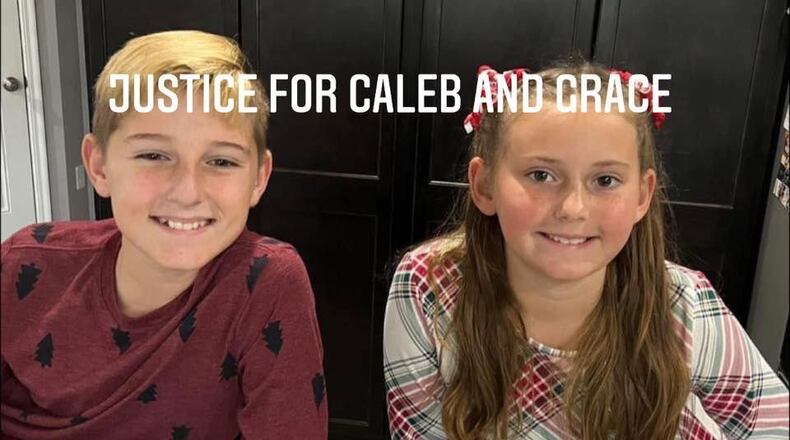In January 2022, Caleb and Grace became the victims of a murder-suicide by Elliot’s estranged husband, Shane, in a tragedy Elliot believes could have been prevent.
“I’m coming before you today to hopefully save another mom, a woman, (or a child),” Elliot said on Wednesday.
Elliot, who is a survivor of domestic violence from Camden, shared her story during a press conference with the Ohio Domestic Violence Network on Wednesday at the Atrium at the Ohio Statehouse in Columbus, advocating for changes in the courts system, along with support of ODVN.
ODVN released its seventh annual count of domestic violence fatalities, which happened between July 1, 2021 and June 30, 2022, on Wednesday. It found there were 112 fatalities in 72 cases in Ohio, which included 81 deceased victims and 31 deceased perpetrators. Of the fatalities, 62 were female and 50 were male.
Among the fatalities were 22 children, including 16 under the age of 10. Six of those were infants.
In one case, a 31-year-old pregnant woman was fatally shot in Cincinnati. Medical staff delivered the baby in critical condition before the mother died, but the infant died the following day. The shooting was witnessed by the victim’s 4-year-old sister.
“Every domestic violence fatality is a tragedy, but this year’s youth fatality numbers are truly shocking,” said ODVN’s Director of Systems Advocacy and Policy Council, Lisa DeGeeter.
Elliot, who was the guest speaker at Wednesday’s event, spoke about her struggles to keep her children safe amid multiple system failures before her children were killed in a murder-suicide.
Elliot described the passion she had for caring for her two kids, saying about Caleb, “The first time I heard his heartbeat was the best day of my life.” She also described the relationship she had with her husband, Shane, with whom she said she endured years of abuse and violence. She described being held at gunpoint and choked until she was unconscious.
Shane Elliot was also charged with domestic violence in 2015 following an incident in which Kellie Elliot said she thought her husband was going to kill her. She also learned her husband had drank 22 beers in four hours prior to that incident.
She left the relationship, but she said she returned out of fear. She started planning her escape from her husband in 2018. She said there was another strangulation in February 2018, and by the middle of May 2018 she had left.
Later, in June 2020, Elliot filed for divorce from Shane, and in 2021, she sought help from an official to be an advocate for her children. That guardian ad litem is a court-appointed individual whose job is to look out for the best interest of the child when parents cannot agree.
Elliot said she provided the guardian ad litem with documentation of hospital records, police records, and text messages from her husband to show the pattern of his behavior. Through the divorce process, the guardian ad litem recommended shared custody of the children between Elliot and her husband, and Elliot’s lawyers also recommended she not try to fight the joint custody for fear that she would lose full custody, she said.
“I had such an ache in my gut about this,” Elliot said.
She was not living in the same home when her children were killed. A number of news reports indicated she called for a welfare check after they did not show up for school the next day.
“On Jan. 24, he shot my children four times each in the face and then he turned the gun on himself,” Elliot said.
She said Shane had blood alcohol level of 0.383, four times the legal limit.
“What will it take for domestic violence survivors to be believed, to be heard?” Elliot said. She said she endured the worst thing a mother could go through, adding, “I believe it could have been prevented 100%.”
ODVN also noted on Wednesday that at least 91% of the domestic violence fatalities between July 2021 and June 2022 were caused by guns, a 5% increase from the previous year, and 42% of the cases involved a perpetrator suicide. More than 25% of perpetrators had a known history of domestic violence.
For the second year in a row, no law enforcement officers were killed, but law enforcement killed three perpetrators. In each case where a perpetrator was killed by law enforcement, the domestic violence victim survived.
“Once again, we see that guns are taking the lives of domestic violence victims at devastating rates,” DeGeeter said. “And as tragic as the deaths of perpetrators are, we were pleased that, in those cases, law enforcement saved the lives of victims.”
ODVN works with all 88 counties in Ohio, offering 76 member programs that helped over 81,000 survivors and their children in 2021. For more information, visit www.odvn.org.
About the Author


